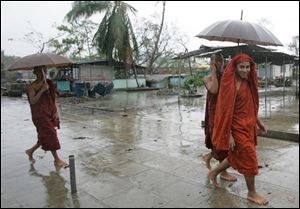
Myanmar junta warns people not to hoard aid
5/15/2008 Updated Myanmar photo gallery
" rel="storyimage1" title="Myanmar-junta-warns-people-not-to-hoard-aid.jpg"/>
Updated Myanmar photo gallery
" rel="storyimage1" title="Myanmar-junta-warns-people-not-to-hoard-aid.jpg"/>
Myanmar Buddhist monks walk in the rain on the outskirts of Yangon, Myanmar on Thursday. (ASSOCIATED PRESS) <br> <img src=http://www.toledoblade.com/graphics/icons/photo.gif> <b><font color=red>VIEW</b></font color=red>: <a href=" /apps/pbcs.dll/gallery?Avis=TO&Dato=20080506&Kategori=NEWS28&Lopenr=563566386&Ref=PH" target="_blank "><b>Updated Myanmar photo gallery</b></a>
YANGON, Myanmar - Myanmar's junta warned Thursday that legal action would be taken against people who trade or hoard international aid in the aftermath of this month's devastating cyclone.
It was the first acknowledgment by the military government, albeit indirectly, of problems with relief operations in the aftermath of Cyclone Nargis, which left at least 38,491 people dead and 27,838 missing.
The warning came amid reports that foreign aid was being sold openly in markets, and that the military was pilfering and diverting aid for its own use.
The ruling junta has been blasted by aid agencies for refusing to allow most foreign experts into the hard-hit Irrawaddy delta and not responding adequately to what they say is a spiraling crisis.
Relief workers also reported some storm survivors were being given spoiled or poor-quality food rather than nutrition-rich biscuits sent by international donors, adding to fears that the ruling military junta in the Southeast Asian country could be misappropriating assistance.
New York-based Human Rights Watch said in a statement Wednesday that it had confirmed an Associated Press report that the military had seized high-energy biscuits that came from abroad, and distributed low-quality, locally produced biscuits to survivors.
Thursday's radio announcement obliquely denied the military was misappropriating aid.
"The government has systematically accepted donations and has distributed the relief goods immediately and directly to the victims," it said.
The government says 38,491 people are known dead and 27,838 missing in the May 2-3 cyclone. But the International Federation of Red Cross and Red Crescent Societies estimated the death toll was between 68,833 and 127,990. The U.N. says more than 100,000 may have died.
The U.N. and the Red Cross say between 1.6 and 2.5 million people are in urgent need of food, water and shelter. Only 270,000 have been reached so far by the aid groups.
Tons of foreign aid including water, blankets, mosquito nets, tarpaulins, medicines and tents have been sent to Myanmar, but its delivery has been slowed down because of bottlenecks, poor infrastructure and bureaucratic tangles.
The junta insists on taking control of the distribution. It has allowed the U.N. and some other agencies to hand out the aid directly but prohibited their few foreign staff allowed into Myanmar from leaving Yangon, the country's main city.
Police have turned back foreigners from checkpoints at the city's exits.
"There is a visible fence around Yangon that we don't dare cross. A circle has been drawn around Yangon and expats are confined there," said Tim Costello of aid group World Vision.
He said the group has delivered aid to 100,000 people in spite of the "narrow parameters." But there are tens of thousands more who haven't received help because of heavy rain and lack of helicopters and expert staff.
"While you are getting aid through, it's like getting it through on a 3-inch pipe not 30-inch pipe," Costello said.
The regime insists it can handle the disaster on its own a stance that appears to stem not from its abilities but its deep suspicion of most foreigners, who have frequently criticized its human rights abuses and crackdown on democracy activists.
In a clear sign that politics is playing a role, the junta granted approval to 160 relief workers from India, China, Bangladesh and Thailand, which have rarely criticized Myanmar's democracy record.
With professional aid workers in short supply, ordinary citizens including businessmen, housewives, monks, Christian priests and students have rushed in to provide help.
But even Myanmar citizens are being restricted by the security forces, said Zaw Htin, a 21-year-old medical student who visited hard-hit Bogaley town on Wednesday.
"They (military) don't want us to stay and talk to people. They want us to leave the supplies with them for distribution. But how can I treat them if I can't talk to them? How do we administer medical care if we can't touch them, feel their pulse or give them advice?" she said.
"It was overwhelming even for us who have seen a lot of suffering and death," Zaw Htin said.
Also Thursday, the junta announced that voters had overwhelmingly backed a pro-military constitution in a referendum that was held one week after the cyclone.
Human rights organizations and dissident groups bitterly accused the junta of neglecting disaster victims in going ahead with the vote, and have criticized the proposed constitution as designed to perpetuate military rule.
State radio said the draft constitution was approved by 92.4 percent of the 22 million eligible voters. It put voter turnout Saturday at more than 99 percent of eligible voters in areas that went to the polls.
Voting was postponed until May 24 in the Irrawaddy delta and Yangon areas, which were worst hit by Cyclone Nargis. But state radio said the results of the late balloting could not mathematically reverse the constitution's approval.
"People are dying and they are talking about the referendum?" said Kyaw Muang, a small food store owner in Yangon. "They (the generals) don't even care about dying people, you think they care about democracy for living people?" he said.
"I don't care about the referendum. It doesn't mean anything," he said.
Human Rights Watch also slammed the timing of the constitution announcement and questioned the accuracy of the results.
David Mathieson, a spokesman in Bangkok, Thailand, said the junta hopes that by announcing the results now it would divert attention away from its handling of the disaster and its refusal to cooperate with the international community.
"It seems strategically timed because you would have thought with how busy they were in cleaning up the cyclone that they never would have had time to count this properly," he said.